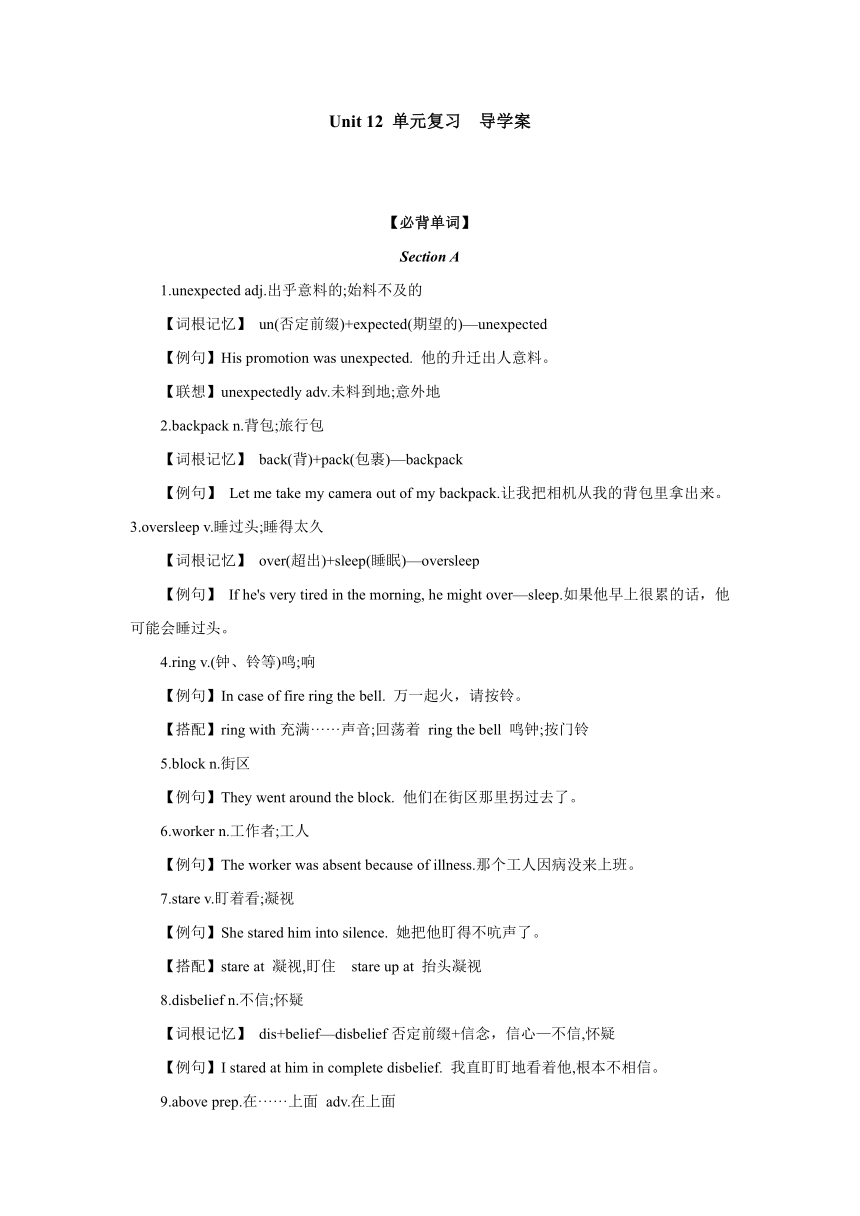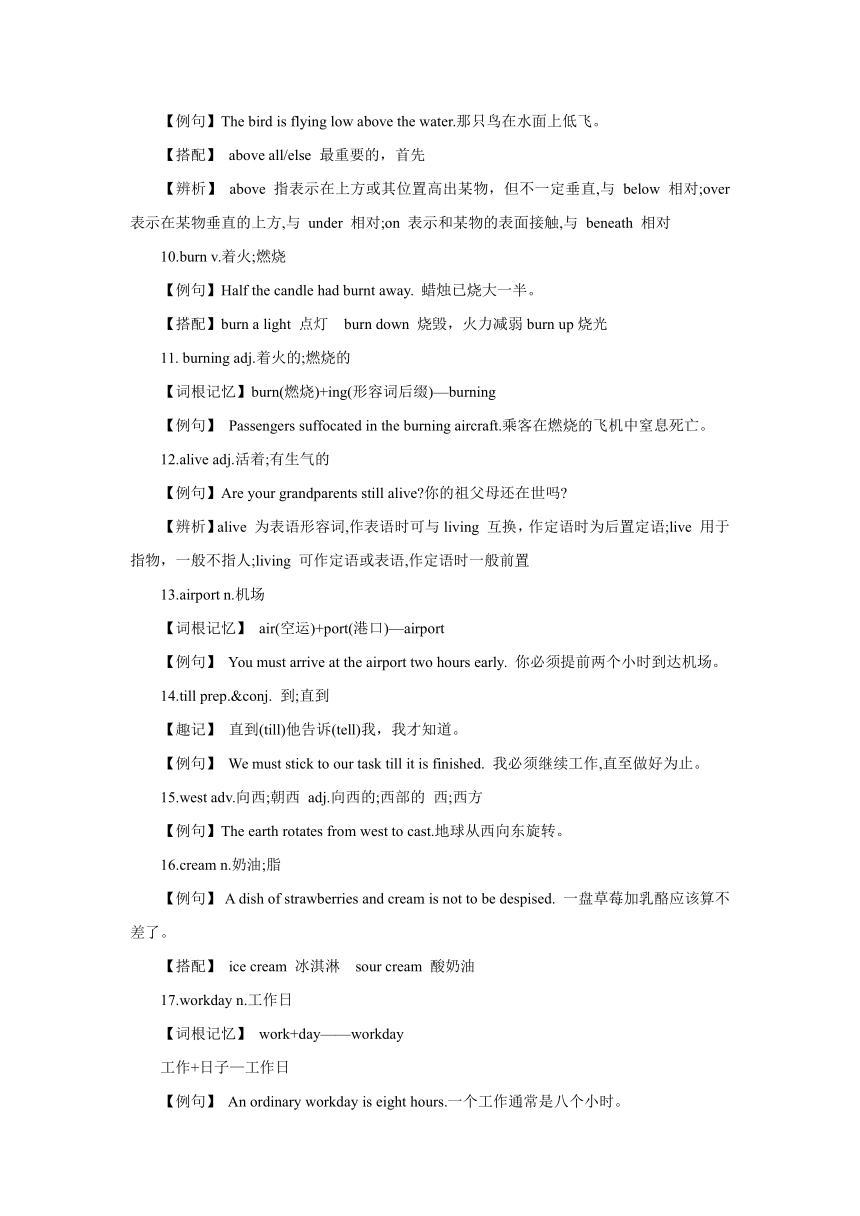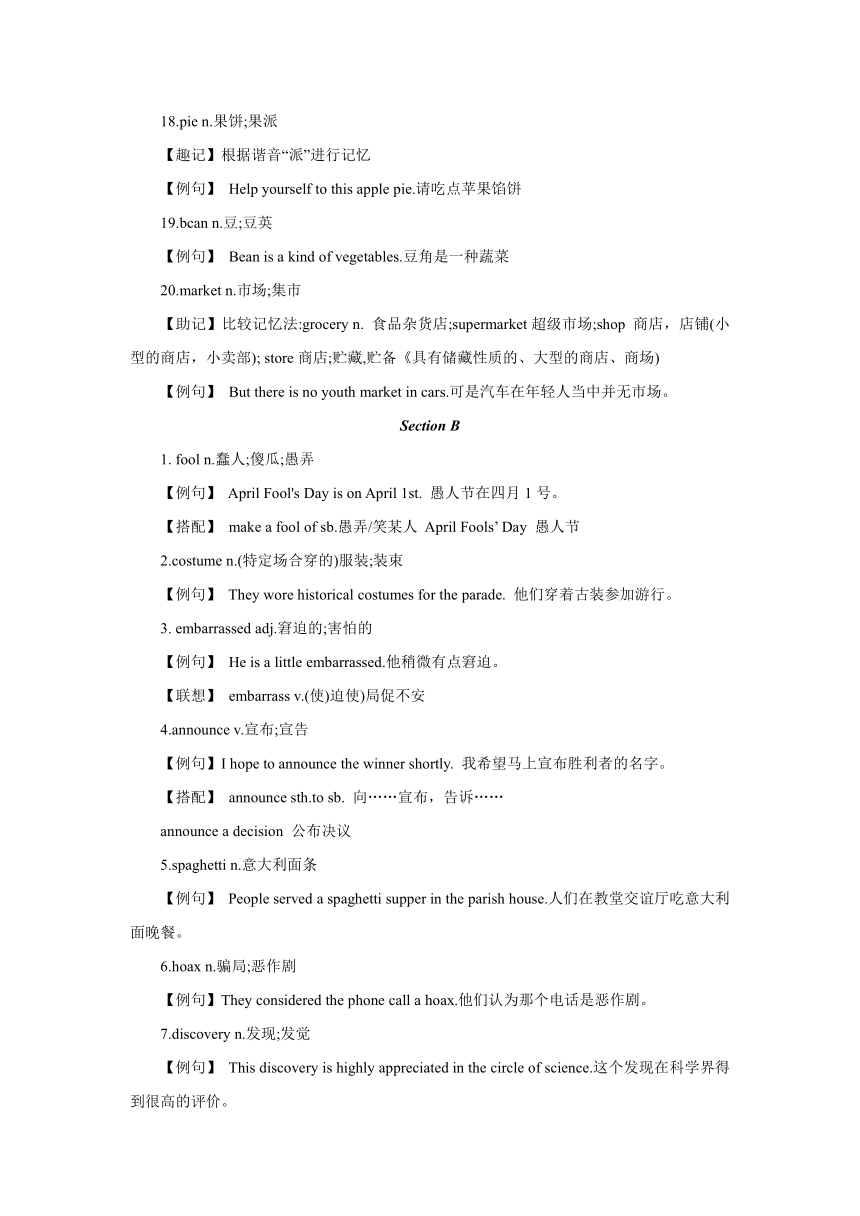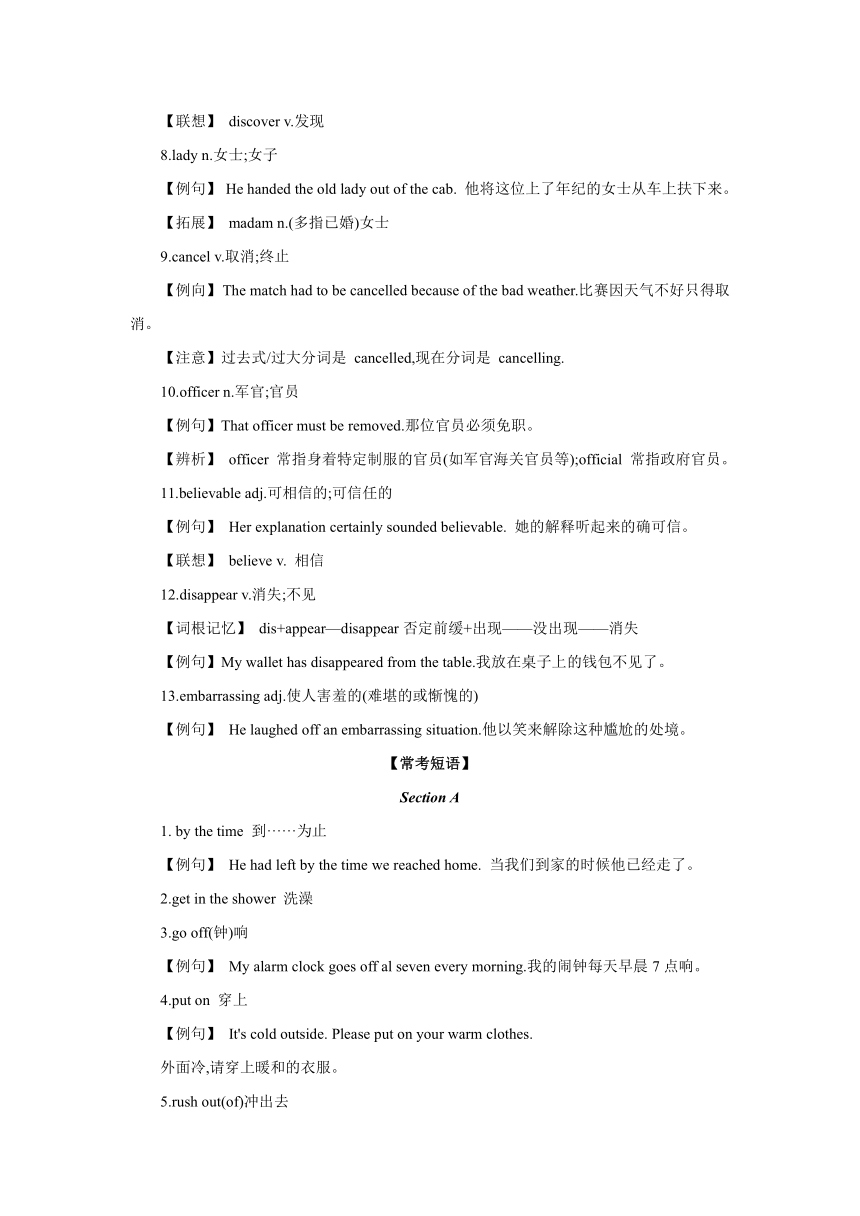Unit 12 Life is full of the unexpected 单元复习导学案 人教版九年级英语全册
文档属性
| 名称 | Unit 12 Life is full of the unexpected 单元复习导学案 人教版九年级英语全册 |  | |
| 格式 | docx | ||
| 文件大小 | 29.3KB | ||
| 资源类型 | 教案 | ||
| 版本资源 | 人教新目标(Go for it)版 | ||
| 科目 | 英语 | ||
| 更新时间 | 2024-06-03 06:54:39 | ||
图片预览




文档简介
Unit 12 单元复习 导学案
【必背单词】
Section A
1.unexpected adj.出乎意料的;始料不及的
【词根记忆】 un(否定前缀)+expected(期望的)—unexpected
【例句】His promotion was unexpected. 他的升迁出人意料。
【联想】unexpectedly adv.未料到地;意外地
2.backpack n.背包;旅行包
【词根记忆】 back(背)+pack(包裹)—backpack
【例句】 Let me take my camera out of my backpack.让我把相机从我的背包里拿出来。3.oversleep v.睡过头;睡得太久
【词根记忆】 over(超出)+sleep(睡眠)—oversleep
【例句】 If he's very tired in the morning, he might over—sleep.如果他早上很累的话,他可能会睡过头。
4.ring v.(钟、铃等)鸣;响
【例句】In case of fire ring the bell. 万一起火,请按铃。
【搭配】ring with充满······声音;回荡着 ring the bell 鸣钟;按门铃
5.block n.街区
【例句】They went around the block. 他们在街区那里拐过去了。
6.worker n.工作者;工人
【例句】The worker was absent because of illness.那个工人因病没来上班。
7.stare v.盯着看;凝视
【例句】She stared him into silence. 她把他盯得不吭声了。
【搭配】stare at 凝视,盯住 stare up at 抬头凝视
8.disbelief n.不信;怀疑
【词根记忆】 dis+belief—disbelief否定前缀+信念,信心—不信,怀疑
【例句】I stared at him in complete disbelief. 我直盯盯地看着他,根本不相信。
9.above prep.在······上面 adv.在上面
【例句】The bird is flying low above the water.那只鸟在水面上低飞。
【搭配】 above all/else 最重要的,首先
【辨析】 above 指表示在上方或其位置高出某物,但不一定垂直,与 below 相对;over 表示在某物垂直的上方,与 under 相对;on 表示和某物的表面接触,与 beneath 相对
10.burn v.着火;燃烧
【例句】Half the candle had burnt away. 蜡烛已烧大一半。
【搭配】burn a light 点灯 burn down 烧毁,火力减弱burn up烧光
11. burning adj.着火的;燃烧的
【词根记忆】burn(燃烧)+ing(形容词后缀)—burning
【例句】 Passengers suffocated in the burning aircraft.乘客在燃烧的飞机中窒息死亡。
12.alive adj.活着;有生气的
【例句】Are your grandparents still alive 你的祖父母还在世吗
【辨析】alive 为表语形容词,作表语时可与living 互换,作定语时为后置定语;live 用于指物,一般不指人;living 可作定语或表语,作定语时一般前置
13.airport n.机场
【词根记忆】 air(空运)+port(港口)—airport
【例句】 You must arrive at the airport two hours early. 你必须提前两个小时到达机场。
14.till prep.&conj. 到;直到
【趣记】 直到(till)他告诉(tell)我,我才知道。
【例句】 We must stick to our task till it is finished. 我必须继续工作,直至做好为止。
15.west adv.向西;朝西 adj.向西的;西部的 西;西方
【例句】The earth rotates from west to cast.地球从西向东旋转。
16.cream n.奶油;脂
【例句】 A dish of strawberries and cream is not to be despised. 一盘草莓加乳酪应该算不差了。
【搭配】 ice cream 冰淇淋 sour cream 酸奶油
17.workday n.工作日
【词根记忆】 work+day——workday
工作+日子—工作日
【例句】 An ordinary workday is eight hours.一个工作通常是八个小时。
18.pie n.果饼;果派
【趣记】根据谐音“派”进行记忆
【例句】 Help yourself to this apple pie.请吃点苹果馅饼
19.bcan n.豆;豆英
【例句】 Bean is a kind of vegetables.豆角是一种蔬菜
20.market n.市场;集市
【助记】比较记忆法:grocery n. 食品杂货店;supermarket超级市场;shop 商店,店铺(小型的商店,小卖部); store商店;贮藏,贮备《具有储藏性质的、大型的商店、商场)
【例句】 But there is no youth market in cars.可是汽车在年轻人当中并无市场。
Section B
1. fool n.蠢人;傻瓜;愚弄
【例句】 April Fool's Day is on April 1st. 愚人节在四月1号。
【搭配】 make a fool of sb.愚弄/笑某人 April Fools’ Day 愚人节
2.costume n.(特定场合穿的)服装;装束
【例句】 They wore historical costumes for the parade. 他们穿着古装参加游行。
3. embarrassed adj.窘迫的;害怕的
【例句】 He is a little embarrassed.他稍微有点窘迫。
【联想】 embarrass v.(使)迫使)局促不安
4.announce v.宣布;宣告
【例句】I hope to announce the winner shortly. 我希望马上宣布胜利者的名字。
【搭配】 announce sth.to sb. 向……宣布,告诉……
announce a decision 公布决议
5.spaghetti n.意大利面条
【例句】 People served a spaghetti supper in the parish house.人们在教堂交谊厅吃意大利面晚餐。
6.hoax n.骗局;恶作剧
【例句】They considered the phone call a hoax.他们认为那个电话是恶作剧。
7.discovery n.发现;发觉
【例句】 This discovery is highly appreciated in the circle of science.这个发现在科学界得到很高的评价。
【联想】 discover v.发现
8.lady n.女士;女子
【例句】 He handed the old lady out of the cab. 他将这位上了年纪的女士从车上扶下来。
【拓展】 madam n.(多指已婚)女士
9.cancel v.取消;终止
【例向】 The match had to be cancelled because of the bad weather.比赛因天气不好只得取消。
【注意】过去式/过大分词是 cancelled,现在分词是 cancelling.
10.officer n.军官;官员
【例句】That officer must be removed.那位官员必须免职。
【辨析】 officer 常指身着特定制服的官员(如军官海关官员等);official 常指政府官员。
11.believable adj.可相信的;可信任的
【例句】 Her explanation certainly sounded believable. 她的解释听起来的确可信。
【联想】 believe v. 相信
12.disappear v.消失;不见
【词根记忆】 dis+appear—disappear否定前缓+出现——没出现——消失
【例句】My wallet has disappeared from the table.我放在桌子上的钱包不见了。
13.embarrassing adj.使人害羞的(难堪的或惭愧的)
【例句】 He laughed off an embarrassing situation.他以笑来解除这种尴尬的处境。
【常考短语】
Section A
1. by the time 到······为止
【例句】 He had left by the time we reached home. 当我们到家的时候他已经走了。
2.get in the shower 洗澡
3.go off(钟)响
【例句】 My alarm clock goes off al seven every morning.我的闹钟每天早晨7点响。
4.put on 穿上
【例句】 It's cold outside. Please put on your warm clothes.
外面冷,请穿上暖和的衣服。
5.rush out(of)冲出去
【例句】 He picked up his hat and rushed out of the door.他拿起帽子就冲出门去。
6.give sb. a lift 捎某人一程
【例句】 He often gives me a lift to the park 他经常捐我去公园。
7.leave my backpack at home 把背包忘在家里
8.miss both events 错过两个事件
9.befullof充满;装满
【例句】The bottle is full of water.瓶子里装满了水。
10.find a job 找到一份工作
11.World Trade Center 世界贸易中心
12.be about to 刚要;即将
【例句】The plane is about to take off. 飞机即将起飞。
13.go up 上楼
14.wait in line 排队等候
15.be late for class 上课迟到
16.stare in disbelief at 难以置信地盯着
17.wake up 醒来
18.fcel/be lucky to do sth感到做某事很幸运
19.jump out of bed 跳下床
20.bad luck 坏运气
21.think to oneself 盘算;自思自付
22.hear about 听说;获悉
23.the day before 前一天
24.turn into 变成
【例句】 The farmers are turning wasteland into rice fields. 农民把荒地变成稻田。
25.in disbelief 疑惑地
26. brush one's teeth 刷牙
27.show v.赶到;露面
【例句】 We waited until six o'clock but she did not show up.我们一直等到了 6 点,但是她始终没有露面。
28.by the end of在(某时间点)以前
【例句】 He had finished his great works by the end of1980.到 1980 年底,他已完成了他的巨著。
29.in line with 与······成一排
【例句】 You should stand in line with the other girls. 你应该和其他女孩站在一排。
30.take off 起飞
3l.arrive at 到达
32.leave for动身去……
【例句】 She left for the station ten minutes ago. 她+分钟前去车站了。
Section B
1. no more 不再
【例句】She no more lives here她不再住在这儿了
2.stay up热夜
【例句】 I stayed up late until one o'clock in the morning.我熬夜一直到凌晨 1点。
3.get dressed 穿衣服
【例句】 Hurry up and get dressed. 快点儿穿上衣服。
4.April Fool's Day 愚人节
5.have a test 进行考试
6.take place 发生
7.around the world 全世界
8.all kinds of 各种各样的
9.play jokes on sb和某人开玩笑
10.sell out 卖完;卖光
【例句】 Football games often sell out well in advance. 足球比赛经常在开赛前很久票就已经售光了。
11. lose weight 减肥
12.end up with 以……结束
13.get married 结婚
【例向】 She got married to a policeman three years ago. 三年前她和一名警察结了婚14.hundreds of 数以百计的
【例句】 There are hundreds of people in the restaurant. 这家餐馆里有数百人。
15.costume party化装舞会
【例句】 She wore an antique gown to the costume party. 她穿着一件过时的长袍参加化妆舞会
16.turn around 调头
17.run away 逃跑
【例句】 It's best not to run away from your problems. 最好不要逃避你的问题。
【重点句型】
Section A
1.What bad luck! 真倒霉!
本句为 what引导的感叹句,后面省略了I had,其中what修饰不可数名词 luck。感叹句是表达喜、怒、哀、乐以及惊奇惊讶等强烈感情的句子.通常由 what 或 how引导。其结构为:
What+a(n)+形容词+单数可数名词(+主语+谓语)!
【例句】 What an interesting film it is!多么有的电影啊!
What+形容词+复数可数名词/不可数名词(+主语+谓语 )!
【例句】 What beautiful flowers they are! 它们是多么漂亮的花啊!
What fine weather it is today! 今天天气多好啊!
【拓展】①How+形容词/副词+主语+谓语!
【例句】 How careful she is! 她是多么细心啊!
How+主语+谓语!
【例句】How time flies!时光飞逝!
2. The other planes were full so I had to wait till the next day.其他的航班都已经满员,因此我不得不等到第二天。till(—until)意为“到;直到”。此处用作介词,后接词或短语;也可用作连词,后接时间状语从句。其用法与 until 的用法基本相同,可用于肯定句或否定句中。其体用法为:
(1)用于肯定句时,(主)句中的谓语动词用延续性或状态动词,表示该动作或状态一直延续到 till/until 所表示的时间为止。
【例句】 They waited here till/until ten o'clock.他们在这一直等到 10 点钟。(介词)
She watched TV till/until her mother came back她看电视直到她母亲回来。(看电视的动作延续到母亲回来才结束)(连闻)
(2)用于否定句,(主)句中谓语动词一般是非延续性的,表示该动作直到 till/until 所表示的时间才发生,意为“直到……才……”
【例句】 He didn't come till/until five o'clock. 他直到5点钟才来。(介词)
He didn't appear till/until the concert had begun. 直到音乐会开始了他才露面。(他露面的动作直到音乐会开始才发生)(连词)
Section B
1.It happens on April 1st every year and is a day when many people play all kinds of tricks and jokes on each other.它在每年的4月1日,这是一个许多人会互相搞各种各样的恶作剧和开各种各样的玩笑的日子。句中 when many people on each other 为定语从句,由关系副词when引导,修饰表示时间的先行词a day。
【例句】 Ill never forget the day when I joined the league. 我水远忘不了我入团的那天。
【语法总结】
过去完成时
1. 过去完成时的意义过去完成时表示在过去某个时间或某个动作之前发生的动作或存在的状态,它表示动作发生的时间是“过去的过去”,它是一种相对于一般过去的时态,没有一般过去时就没有过去完成时。
2.过去完成时的构成
过去完成的谓语由“助动词 had+过去分词”构成。否定式为“had not+过去分词”,had not 缩写为hadn’t.
3.过去完成时的用法
(1)表示一个动作或状态在过去某一时间或动作之前已经完成,即发生在“过去的过去”这个过去的时间可以用 by, belore 等介词短语或者一个时间状语从句来表示When I woke up,it had stopped raining.我醒来时,雨已经停了。
(2)表示某一动作或状态在过去某时之前已经开始,一直延续到这一过去的时间。常与表延续的时间状语,如 by the end of—过去的时间by the time+从句(一般过去时)等连用。
By the end of last year, she had worked in the factory for twenty years. 到去年年底她已经在这家工厂工作 20 年了。
4.过去完成时的判断依据
(1)由时间状语来判定
一般说来,各种时态都有特定的时间状语。与过去完成时连用的时间状语有:
by+过去的时间点
She had finished reading he book by 9 o'clock yesterday. 到昨天9点钟时,她已经读完了这本书。
by the end of+过去的时间
We had learned over two thousand English words by the end of last term. 到上学期末我们已学了两千多个英语单词了。
(2)由“过去的过去”来判定
过去完成时表示“过去的过去”,指过去某一动作之前已经发生或完成的动作,即动作有先后关系,动作在前的用过去完成时,在后的用一般过去时。这种用法常出现在:①含有宾语从句的复合句中;当主句为一般过去时,且从句的动作先于主句的动作发生时,从句要用过去完成时。像在 told,said,knew,heard,thought 等动词后的宾语从句。
She said that she had seen the film before.她说她以前看过这部电影。
②含有状语从句的复合句中,含有时间、原因、方式等状语从句的复合中,主、从的动作发生有先后关系,动作在前的要用过去完成时,动作在后的要用一般过去时。When I got to the station,the train had already left,我到达车站时,火车已经离开了
1. By the end of last week,she _______in the west of China for two months helping the homeless children.
A. will stay B. has stayed C. would stay D. had stayed
2. —We all went to the cinema except you last night. Why didn't you come
—Because I ________ that movie twice.
A have watched B. had watched
C. was watching D. would watch
3. By the end of last week,she _______in the west of China for the plane ________when we got to the airport.
A. had taken off B. was taken off
C. will take off D. is taking off
【必背单词】
Section A
1.unexpected adj.出乎意料的;始料不及的
【词根记忆】 un(否定前缀)+expected(期望的)—unexpected
【例句】His promotion was unexpected. 他的升迁出人意料。
【联想】unexpectedly adv.未料到地;意外地
2.backpack n.背包;旅行包
【词根记忆】 back(背)+pack(包裹)—backpack
【例句】 Let me take my camera out of my backpack.让我把相机从我的背包里拿出来。3.oversleep v.睡过头;睡得太久
【词根记忆】 over(超出)+sleep(睡眠)—oversleep
【例句】 If he's very tired in the morning, he might over—sleep.如果他早上很累的话,他可能会睡过头。
4.ring v.(钟、铃等)鸣;响
【例句】In case of fire ring the bell. 万一起火,请按铃。
【搭配】ring with充满······声音;回荡着 ring the bell 鸣钟;按门铃
5.block n.街区
【例句】They went around the block. 他们在街区那里拐过去了。
6.worker n.工作者;工人
【例句】The worker was absent because of illness.那个工人因病没来上班。
7.stare v.盯着看;凝视
【例句】She stared him into silence. 她把他盯得不吭声了。
【搭配】stare at 凝视,盯住 stare up at 抬头凝视
8.disbelief n.不信;怀疑
【词根记忆】 dis+belief—disbelief否定前缀+信念,信心—不信,怀疑
【例句】I stared at him in complete disbelief. 我直盯盯地看着他,根本不相信。
9.above prep.在······上面 adv.在上面
【例句】The bird is flying low above the water.那只鸟在水面上低飞。
【搭配】 above all/else 最重要的,首先
【辨析】 above 指表示在上方或其位置高出某物,但不一定垂直,与 below 相对;over 表示在某物垂直的上方,与 under 相对;on 表示和某物的表面接触,与 beneath 相对
10.burn v.着火;燃烧
【例句】Half the candle had burnt away. 蜡烛已烧大一半。
【搭配】burn a light 点灯 burn down 烧毁,火力减弱burn up烧光
11. burning adj.着火的;燃烧的
【词根记忆】burn(燃烧)+ing(形容词后缀)—burning
【例句】 Passengers suffocated in the burning aircraft.乘客在燃烧的飞机中窒息死亡。
12.alive adj.活着;有生气的
【例句】Are your grandparents still alive 你的祖父母还在世吗
【辨析】alive 为表语形容词,作表语时可与living 互换,作定语时为后置定语;live 用于指物,一般不指人;living 可作定语或表语,作定语时一般前置
13.airport n.机场
【词根记忆】 air(空运)+port(港口)—airport
【例句】 You must arrive at the airport two hours early. 你必须提前两个小时到达机场。
14.till prep.&conj. 到;直到
【趣记】 直到(till)他告诉(tell)我,我才知道。
【例句】 We must stick to our task till it is finished. 我必须继续工作,直至做好为止。
15.west adv.向西;朝西 adj.向西的;西部的 西;西方
【例句】The earth rotates from west to cast.地球从西向东旋转。
16.cream n.奶油;脂
【例句】 A dish of strawberries and cream is not to be despised. 一盘草莓加乳酪应该算不差了。
【搭配】 ice cream 冰淇淋 sour cream 酸奶油
17.workday n.工作日
【词根记忆】 work+day——workday
工作+日子—工作日
【例句】 An ordinary workday is eight hours.一个工作通常是八个小时。
18.pie n.果饼;果派
【趣记】根据谐音“派”进行记忆
【例句】 Help yourself to this apple pie.请吃点苹果馅饼
19.bcan n.豆;豆英
【例句】 Bean is a kind of vegetables.豆角是一种蔬菜
20.market n.市场;集市
【助记】比较记忆法:grocery n. 食品杂货店;supermarket超级市场;shop 商店,店铺(小型的商店,小卖部); store商店;贮藏,贮备《具有储藏性质的、大型的商店、商场)
【例句】 But there is no youth market in cars.可是汽车在年轻人当中并无市场。
Section B
1. fool n.蠢人;傻瓜;愚弄
【例句】 April Fool's Day is on April 1st. 愚人节在四月1号。
【搭配】 make a fool of sb.愚弄/笑某人 April Fools’ Day 愚人节
2.costume n.(特定场合穿的)服装;装束
【例句】 They wore historical costumes for the parade. 他们穿着古装参加游行。
3. embarrassed adj.窘迫的;害怕的
【例句】 He is a little embarrassed.他稍微有点窘迫。
【联想】 embarrass v.(使)迫使)局促不安
4.announce v.宣布;宣告
【例句】I hope to announce the winner shortly. 我希望马上宣布胜利者的名字。
【搭配】 announce sth.to sb. 向……宣布,告诉……
announce a decision 公布决议
5.spaghetti n.意大利面条
【例句】 People served a spaghetti supper in the parish house.人们在教堂交谊厅吃意大利面晚餐。
6.hoax n.骗局;恶作剧
【例句】They considered the phone call a hoax.他们认为那个电话是恶作剧。
7.discovery n.发现;发觉
【例句】 This discovery is highly appreciated in the circle of science.这个发现在科学界得到很高的评价。
【联想】 discover v.发现
8.lady n.女士;女子
【例句】 He handed the old lady out of the cab. 他将这位上了年纪的女士从车上扶下来。
【拓展】 madam n.(多指已婚)女士
9.cancel v.取消;终止
【例向】 The match had to be cancelled because of the bad weather.比赛因天气不好只得取消。
【注意】过去式/过大分词是 cancelled,现在分词是 cancelling.
10.officer n.军官;官员
【例句】That officer must be removed.那位官员必须免职。
【辨析】 officer 常指身着特定制服的官员(如军官海关官员等);official 常指政府官员。
11.believable adj.可相信的;可信任的
【例句】 Her explanation certainly sounded believable. 她的解释听起来的确可信。
【联想】 believe v. 相信
12.disappear v.消失;不见
【词根记忆】 dis+appear—disappear否定前缓+出现——没出现——消失
【例句】My wallet has disappeared from the table.我放在桌子上的钱包不见了。
13.embarrassing adj.使人害羞的(难堪的或惭愧的)
【例句】 He laughed off an embarrassing situation.他以笑来解除这种尴尬的处境。
【常考短语】
Section A
1. by the time 到······为止
【例句】 He had left by the time we reached home. 当我们到家的时候他已经走了。
2.get in the shower 洗澡
3.go off(钟)响
【例句】 My alarm clock goes off al seven every morning.我的闹钟每天早晨7点响。
4.put on 穿上
【例句】 It's cold outside. Please put on your warm clothes.
外面冷,请穿上暖和的衣服。
5.rush out(of)冲出去
【例句】 He picked up his hat and rushed out of the door.他拿起帽子就冲出门去。
6.give sb. a lift 捎某人一程
【例句】 He often gives me a lift to the park 他经常捐我去公园。
7.leave my backpack at home 把背包忘在家里
8.miss both events 错过两个事件
9.befullof充满;装满
【例句】The bottle is full of water.瓶子里装满了水。
10.find a job 找到一份工作
11.World Trade Center 世界贸易中心
12.be about to 刚要;即将
【例句】The plane is about to take off. 飞机即将起飞。
13.go up 上楼
14.wait in line 排队等候
15.be late for class 上课迟到
16.stare in disbelief at 难以置信地盯着
17.wake up 醒来
18.fcel/be lucky to do sth感到做某事很幸运
19.jump out of bed 跳下床
20.bad luck 坏运气
21.think to oneself 盘算;自思自付
22.hear about 听说;获悉
23.the day before 前一天
24.turn into 变成
【例句】 The farmers are turning wasteland into rice fields. 农民把荒地变成稻田。
25.in disbelief 疑惑地
26. brush one's teeth 刷牙
27.show v.赶到;露面
【例句】 We waited until six o'clock but she did not show up.我们一直等到了 6 点,但是她始终没有露面。
28.by the end of在(某时间点)以前
【例句】 He had finished his great works by the end of1980.到 1980 年底,他已完成了他的巨著。
29.in line with 与······成一排
【例句】 You should stand in line with the other girls. 你应该和其他女孩站在一排。
30.take off 起飞
3l.arrive at 到达
32.leave for动身去……
【例句】 She left for the station ten minutes ago. 她+分钟前去车站了。
Section B
1. no more 不再
【例句】She no more lives here她不再住在这儿了
2.stay up热夜
【例句】 I stayed up late until one o'clock in the morning.我熬夜一直到凌晨 1点。
3.get dressed 穿衣服
【例句】 Hurry up and get dressed. 快点儿穿上衣服。
4.April Fool's Day 愚人节
5.have a test 进行考试
6.take place 发生
7.around the world 全世界
8.all kinds of 各种各样的
9.play jokes on sb和某人开玩笑
10.sell out 卖完;卖光
【例句】 Football games often sell out well in advance. 足球比赛经常在开赛前很久票就已经售光了。
11. lose weight 减肥
12.end up with 以……结束
13.get married 结婚
【例向】 She got married to a policeman three years ago. 三年前她和一名警察结了婚14.hundreds of 数以百计的
【例句】 There are hundreds of people in the restaurant. 这家餐馆里有数百人。
15.costume party化装舞会
【例句】 She wore an antique gown to the costume party. 她穿着一件过时的长袍参加化妆舞会
16.turn around 调头
17.run away 逃跑
【例句】 It's best not to run away from your problems. 最好不要逃避你的问题。
【重点句型】
Section A
1.What bad luck! 真倒霉!
本句为 what引导的感叹句,后面省略了I had,其中what修饰不可数名词 luck。感叹句是表达喜、怒、哀、乐以及惊奇惊讶等强烈感情的句子.通常由 what 或 how引导。其结构为:
What+a(n)+形容词+单数可数名词(+主语+谓语)!
【例句】 What an interesting film it is!多么有的电影啊!
What+形容词+复数可数名词/不可数名词(+主语+谓语 )!
【例句】 What beautiful flowers they are! 它们是多么漂亮的花啊!
What fine weather it is today! 今天天气多好啊!
【拓展】①How+形容词/副词+主语+谓语!
【例句】 How careful she is! 她是多么细心啊!
How+主语+谓语!
【例句】How time flies!时光飞逝!
2. The other planes were full so I had to wait till the next day.其他的航班都已经满员,因此我不得不等到第二天。till(—until)意为“到;直到”。此处用作介词,后接词或短语;也可用作连词,后接时间状语从句。其用法与 until 的用法基本相同,可用于肯定句或否定句中。其体用法为:
(1)用于肯定句时,(主)句中的谓语动词用延续性或状态动词,表示该动作或状态一直延续到 till/until 所表示的时间为止。
【例句】 They waited here till/until ten o'clock.他们在这一直等到 10 点钟。(介词)
She watched TV till/until her mother came back她看电视直到她母亲回来。(看电视的动作延续到母亲回来才结束)(连闻)
(2)用于否定句,(主)句中谓语动词一般是非延续性的,表示该动作直到 till/until 所表示的时间才发生,意为“直到……才……”
【例句】 He didn't come till/until five o'clock. 他直到5点钟才来。(介词)
He didn't appear till/until the concert had begun. 直到音乐会开始了他才露面。(他露面的动作直到音乐会开始才发生)(连词)
Section B
1.It happens on April 1st every year and is a day when many people play all kinds of tricks and jokes on each other.它在每年的4月1日,这是一个许多人会互相搞各种各样的恶作剧和开各种各样的玩笑的日子。句中 when many people on each other 为定语从句,由关系副词when引导,修饰表示时间的先行词a day。
【例句】 Ill never forget the day when I joined the league. 我水远忘不了我入团的那天。
【语法总结】
过去完成时
1. 过去完成时的意义过去完成时表示在过去某个时间或某个动作之前发生的动作或存在的状态,它表示动作发生的时间是“过去的过去”,它是一种相对于一般过去的时态,没有一般过去时就没有过去完成时。
2.过去完成时的构成
过去完成的谓语由“助动词 had+过去分词”构成。否定式为“had not+过去分词”,had not 缩写为hadn’t.
3.过去完成时的用法
(1)表示一个动作或状态在过去某一时间或动作之前已经完成,即发生在“过去的过去”这个过去的时间可以用 by, belore 等介词短语或者一个时间状语从句来表示When I woke up,it had stopped raining.我醒来时,雨已经停了。
(2)表示某一动作或状态在过去某时之前已经开始,一直延续到这一过去的时间。常与表延续的时间状语,如 by the end of—过去的时间by the time+从句(一般过去时)等连用。
By the end of last year, she had worked in the factory for twenty years. 到去年年底她已经在这家工厂工作 20 年了。
4.过去完成时的判断依据
(1)由时间状语来判定
一般说来,各种时态都有特定的时间状语。与过去完成时连用的时间状语有:
by+过去的时间点
She had finished reading he book by 9 o'clock yesterday. 到昨天9点钟时,她已经读完了这本书。
by the end of+过去的时间
We had learned over two thousand English words by the end of last term. 到上学期末我们已学了两千多个英语单词了。
(2)由“过去的过去”来判定
过去完成时表示“过去的过去”,指过去某一动作之前已经发生或完成的动作,即动作有先后关系,动作在前的用过去完成时,在后的用一般过去时。这种用法常出现在:①含有宾语从句的复合句中;当主句为一般过去时,且从句的动作先于主句的动作发生时,从句要用过去完成时。像在 told,said,knew,heard,thought 等动词后的宾语从句。
She said that she had seen the film before.她说她以前看过这部电影。
②含有状语从句的复合句中,含有时间、原因、方式等状语从句的复合中,主、从的动作发生有先后关系,动作在前的要用过去完成时,动作在后的要用一般过去时。When I got to the station,the train had already left,我到达车站时,火车已经离开了
1. By the end of last week,she _______in the west of China for two months helping the homeless children.
A. will stay B. has stayed C. would stay D. had stayed
2. —We all went to the cinema except you last night. Why didn't you come
—Because I ________ that movie twice.
A have watched B. had watched
C. was watching D. would watch
3. By the end of last week,she _______in the west of China for the plane ________when we got to the airport.
A. had taken off B. was taken off
C. will take off D. is taking off
同课章节目录
- Unit 1 How can we become good learners.
- Section A
- Section B
- Unit 2 I think that mooncakes are delicious!
- Section A
- Section B
- Unit 3 Could you please tell me where the restroom
- Section A
- Section B
- Unit 4 I used to be afraid of the dark.
- Section A
- Section B
- Unit 5 What are the shirts made of?
- Section A
- Section B
- Review of Units 1-5
- Unit 6 When was it invented?
- Section A
- Section B
- Unit 7 Teenagers should be allowed to choose their
- Section A
- Section B
- Unit 8 It must belong to Carla.
- Section A
- Section B
- Unit 9 I like music that I can dance to.
- Section A
- Section B
- Unit 10 You're supposed to shake hands.
- Section A
- Section B
- Review of Units 6-10
- Unit 11 Sad movies make me cry.
- Section A
- Section B
- Unit 12 Life is full of the unexpected
- Section A
- Section B
- Unit 13 We're trying to save the earth!
- Section A
- Section B
- Unit 14 I remember meeting all of you in Grade 7.
- Section A
- Section B
- Review of Units 11-14
